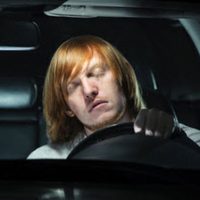Dangers of Drowsy Driving

Most of us have gotten behind the wheel of a vehicle when we weren’t feeling well-rested. Maybe it was late at night after a concert or other event and you just wanted to get home. Perhaps you went to work early in the morning despite being up all night with a newborn baby. Alcohol and medications can cause excessive tiredness. Or maybe you have insomnia and just don’t sleep well in general.
Americans are tired. Sleeping problems are widespread in the United States. Because of this, many of us engage in drowsy driving. It may seem harmless, but when you are extremely tired, the risk of falling asleep while behind the wheel is great. This can lead to a major accident for you and innocent victims.
Drowsy driving is dangerous and is believed to be as bad as driving while under the influence of alcohol. That’s because sleep deprivation leads to mental impairment that is similar to drunkenness. Research shows that 24 hours of sleep deprivation is the same as a person having blood alcohol content (BAC) of 0.10, which is above the legal limit. Statistics indicate that more than 20% of fatal accidents are caused by drowsy driving. In 2017, it led to 91,000 accidents, with 800 of those fatal.
Drowsy is so dangerous because the person engages in microsleeps. These occur when a person shuts their eyes for a few seconds. When this happens while driving, those three seconds without watching the road can lead to a serious crash with an object, person, or other vehicle. On top of that, drowsy driving is likened to alcohol impairment, as mentioned above. This makes a person more easily distracted and less focused on their surroundings. It slows their reaction time and leads to worsened decision-making, which can lead to accidents.
Anyone can be affected by drowsy driving, but those who are susceptible to it include:
- People who drive for a living, such as long-haul truckers and bus drivers.
- People who work long hours, irregular shifts, or night shifts.
- People with sleep problems, such as insomnia, narcolepsy, and sleep apnea.
- Teenagers who have less driving experience and high rates of insufficient sleep.
You should pull over and rest if you are driving and experience the following symptoms:
- Frequent yawning
- Feelings of dozing off
- Tired or droopy eyes
- Increase in blinking
- Drifting into other lanes or hitting “rumble strips” on the road
- Following other cars too closely
- Difficulty maintaining proper speed
- Inability to remember the last few miles
- Missing a road sign or exit
Contact Us Today
Driving while tired may not seem like a big deal, but it can cause serious crashes and even fatalities. In fact, it’s comparable to driving drunk.
Did a tired or sleeping driver cause your crash? If so, count on the team of Columbia drowsy/fatigued driving accident lawyers at Simmons Law Firm to help you recover the damages you are owed. Fill out the online form or call (803) 779-4600 to schedule a free consultation.
Source:
sleepfoundation.org/drowsy-driving
